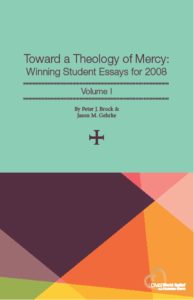 The Lord be with you
The Lord be with you
There are actually two pamphlets titled Toward a Theology of Mercy: Winning Student Essays for 2008, containing mercy essays; volume I and volume II. Both are downloadable. This is a review of volume I.
From the Preface: “The Lutheran Church—Missouri Synod (LCMS) has a history of sponsoring the “Toward a Theology of Mercy” essay contest at Concordia Theological Seminary, Fort Wayne. This writing contest was initiated by Rev. Matthew C. Harrison, executive director of LCMS World Relief and Human Care, as a way to encourage students to contemplate the church’s corporate life of mercy and thereby stimulate them to think more deeply about the Lutheran theological foundations of this aspect of our life together in Christ Jesus. In this way, future pastors and deaconesses of the church will be better prepared to be compassionate servants well grounded in the confession of the Gospel, equipped for every good work.”
In this first pamphlet we find an essay by Peter J. Brock, “Space to Be Secular: The Thought of Oswald Bayer as Resource for the Church’s Theology of Mercy.” As you would guess from the title, the essay explores Oswald Bayer’s thought, especially as it relates to us living in “two eons.” The old eon relates to the life we are all born into at our birth. The new eon relates to the life we are reborn into at our baptism. However our life as Christians is not an either/or but a both/and life. Here in time we live in both the old and the new eon. It is at the conjunction of these eons that opportunities for loving mercy exist. It is in this conjunction where we find “space to be secular.” But, Brock writes, “Christians must themselves remember how to be secular and remind the world of the same.” Brock ties our link to this “space” with the Word and the Sacraments. He also explores Luther’s thought, as reflected in Bayer’s theology.
Brock’s essay is followed by an essay by Jason M. Gehrke, “The Christian Life Justified: Luther’s Theology of Mercy in the Tractatus de Libertate Christiana.” The Latin translates as the “Treatise on Christian Liberty,” a famous work of Martin Luther. This treatise has the famous quote, “A Christian is a perfectly free lord of all, subject to none. A Christian is a perfectly dutiful servant of all, subject of all, subject to all.” Another famous quote from this treatise is, “These two sayings are surely true, ‘Good works do not make a man good, but a good man does good works; Evil works do not make a man evil, but an evil man does evil works.’ Thus, it is always needed that the material or substance be good before all good works; and all good works follow and issue forth from the good substance.”
One could say that Gehrke’s essay is an exposition of these two Luther quotes. In this the Christian is actually shaped into the image of Christ. Christ is Lord of all from eternity yet he became human to be servant of all. Jesus is the good tree that produces good fruit. As we are conformed into his image, we also are able to produce good fruit. This all flows from the Gospel. The Law does not convert; it convicts us of our sin. Therefore a “Christian ethic” is empowered and is defined by the Gospel, not the Law. Gehrke writes that, according to Luther, “[T]he doctrine of justification by grace through faith in Christ alone as the sole foundation for a Christian life of mercy.” To craft an ethical life based on the Law is to abandon the Gospel. A Christian, a receiver of God’s grace in Christ, is a vessel of God’s grace to others. Not surprisingly, the role of the Scriptures as Law and Gospel is lifted up and explored in this essay, and therefore in our life of faith and mercy.
Both of these essays are worth the read. They also demonstrate the excellent education our students are receiving at our seminaries. The link below will take you to the pamphlet.
Toward a Theology of Mercy: Winning Student Essays for 2008 – Volume I
